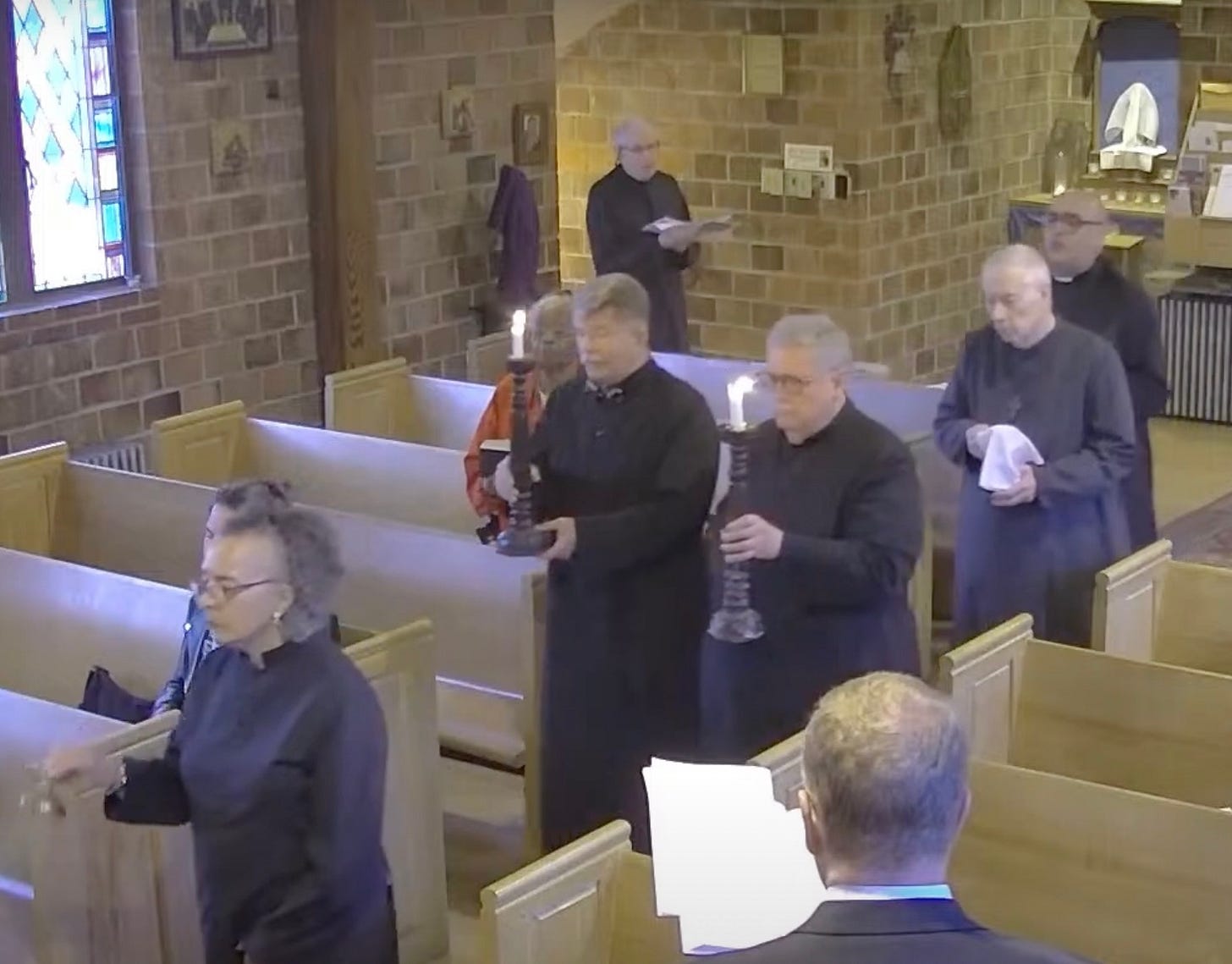The congregation was singing “O sacred head, sore wounded” in the Good Friday Liturgy. A procession was forming to bring the Blessed Sacrament from the Altar of Repose. Fr. Kevin stepped out of the procession whispering in the ear of the old priest and religious. Would you assist me carrying the Sacrament? I moved from the pew and joined the procession. My legs weak and my balance uncertain.
It was a small, kind gesture. An invitation back into life’s procession through the strife, back into the journey, befriended.
The foolish certainties of Christianist right and left
I’ve just read two pieces that capture something of my fear and hope this Easter. The first was Andrew Sullivan’s “The Intensification of Christianism”[i] expressing his horror at the former president’s new Bible and the recent expressions of Christianism. What Sullivan, a Roman Catholic sees “as a politicized version of Christianity, a form of theocratically-motivated illiberalism.” He shared his hope in that “spiritual power that comes with the renunciation of earthly power” while noting how he didn’t invest much in the more liberal tradition.
“Tragically, liberal Christianity has in far too many places become incapable of countering this with simple theological orthodoxy. It has itself become something of a social justice cult almost as politicized and partisan as the right. And yet this week of all weeks, and this Friday of all Fridays, we are invited to understand the deeper spiritual power that comes with the renunciation of earthly power. The longer I’ve lived, the more I have begun to grasp how this authentically Christian understanding of the limits of worldly power is a kind of bulwark for a free society, a guardrail against the foolish certainties of Christianist right and left, and a guarantee of some kind of spiritual humility and social peace.”
The church … has lost faith in itself. It doesn’t have a strong spirituality
The second was Bari Weiss’ conversation with Paul Kingsnorth, an English citizen, living in Ireland, a member of the Romanian Orthodox Church, on living freely in “the age of the machine,” and the meaning of Easter.[ii]
“The church—certainly Britain, anyway—has lost faith in itself. It doesn’t have a strong spirituality. So if you go into a church, you’re not going to get much from it. It feels like a sermon by a liberal NGO or something. It’s fine, but it doesn’t feel like there’s anything to it. And that’s why people in the West, I think at least since the 1960s, always go East if they’re looking for faith, unless they’ve grown up in a strong faith environment themselves.”
“In the church, this Resurrection is the biggest, most astonishing, weirdest thing that’s ever happened to humanity. And it is exactly something that happens when all hope is gone, when your Messiah has just been crucified and buried. Then this astonishing, impossible, and unexpected thing happens, which not only brings him back, but also completely rewires your understanding of what the world is and how it works. And that’s what my coming to Christianity did to me. And every Easter—or Pascha, as we call it in the Eastern church, which is a corruption of [the word] Passover, actually—the story deepens for me. It’s interesting because I used to think that you become a Christian and that’s that and you’re sorted. But it’s not that. It’s the beginning of a journey, and every year the journey gets deeper. So every time you go through this cycle of 40 days of fasting and then a feast at Easter, something else deepens. It’s like you just dropped a couple of inches deeper into this thing that you’re in. And as I say, the world changes shape. So that is the kind of steady hope, and it’s always there. It doesn’t matter what humans do, and not everything is under our control. And that’s okay. There’s always something else. There’s always somebody holding you. That’s how it feels. And it’s rather wonderful. It doesn’t remove the struggles from your life, but it means that they’re in the bigger context of you always being held and watched by something much bigger that’s happening. So yeah, Easter is a pretty wonderful time.”
The deeper point
Paul Kingsnorth and Andrew Sullivan each see their life as being held in a larger reality and truth that is expressed in the practices of the Christian tradition.
“It doesn’t remove the struggles from your life, but it means that they’re in the bigger context of you always being held and watched by something much bigger that’s happening.” (Kingsnorth)
A dissent on Sullivan’s conversation with Richard Dawkins “As an atheist myself, I have a hypothesis about this. Because we atheists never had this promise of a heavenly father who would look after us and reward us when we die, we don’t feel a sense of loss about it. But I can imagine to a Christian, to have this promise and then to imagine it taken away, would be horrible.” Sullivan’s response, “The deeper point, I think, is whether it is possible to be a human being in a universe that is going nowhere and means nothing. I don’t think Richard even sees beyond the empirical.”
that I may fight befriended,
and see in my last strife
to me thine arms extended
upon the cross of life.
This abides,
Robert
Holy Saturday, 2024
[i] The Weekly Dish, March 29, 2024
[ii] “Why an Eco-warrior Left the Movement—and Became a Christian”, The free Press, March 30, 2024




